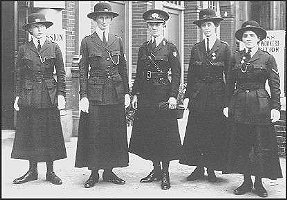[This document comes from Helena Wojtczak's English Social History: Women of Nineteenth-Century Hastings and St.Leonards. An Illustrated Historical Miscellany, which the author has graciously shared with readers of the Victorian Web. Click on the title to obtain the original site, which has additional information.]
Mary Sophia Allen (1878-1964) was a military-minded woman who was probably attracted to the WSPU because it was the most regimented and militant of all the suffrage societies. Born of a wealthy family in Cheltenham, she was educated at Princess Helena College. When she took over the Hastings branch in 1912 she had already achieved national fame (or notoriety). She introduced herself to local suffragettes by giving a talk at the WSPU at 8 Trinity Street describing her window smashing raids on Government buildings in London and Bristol, three terms of imprisonment, her hunger strike and force-feeding.

Mary Allen (right) shares a platform with co-speaker and WSPU leader Mrs Pankhurst (left) at Hastings' Public Hall in 1912
When war broke out in 1914, Mary co-founded the Women's Police Volunteers and was Sub-Commandant. Its members were unpaid. After being invited to Grantham and Hull in 1915 to curb prostitution, she was made a member of the regular police force. For this work she was honoured with an OBE in 1917. She became Commandant of the Women's Police Service in 1919.

Mary Allen, centre
In 1922 she moved to Germany to train women police. After meeting Hitler in 1934 she became a fervent admirer, Nazi sympathiser, and took to wearing jack-boots. Her fascist views obliged her to leave the police service.
Mary Allen wrote several books, including The Pioneer Policewoman (1925), Woman at the Crossroads (1934) and Lady in Blue (1936).
Last modified 2000